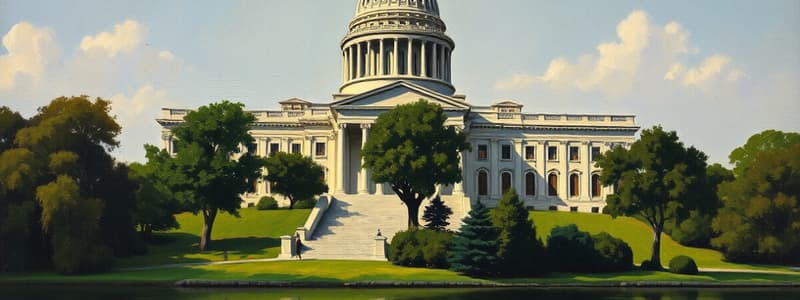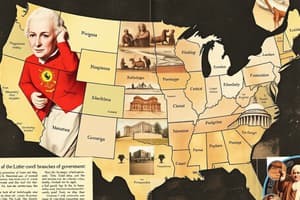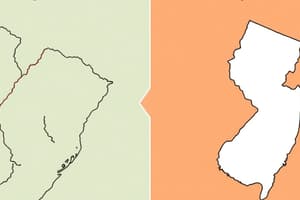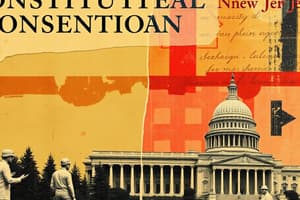Podcast
Questions and Answers
What is the Virginia Plan also known as?
What is the Virginia Plan also known as?
- Small-State Plan
- Great Compromise
- Sherman Plan
- Randolph Plan (correct)
Who drafted the Virginia Plan?
Who drafted the Virginia Plan?
James Madison
What was the New Jersey Plan also known as?
What was the New Jersey Plan also known as?
- Great Compromise
- Connecticut Plan
- Small State Plan (correct)
- Randolph Plan
Who presented the New Jersey Plan?
Who presented the New Jersey Plan?
What is the Connecticut Compromise also known as?
What is the Connecticut Compromise also known as?
What does the 17th Amendment state about the Senate?
What does the 17th Amendment state about the Senate?
What does earmark mean?
What does earmark mean?
What is the role of the House Rules Committee?
What is the role of the House Rules Committee?
What is a pocket veto?
What is a pocket veto?
What is congressional oversight?
What is congressional oversight?
What is the purpose of a census?
What is the purpose of a census?
What is reapportionment?
What is reapportionment?
What is redistricting?
What is redistricting?
What is gerrymandering?
What is gerrymandering?
What does pork barreling refer to?
What does pork barreling refer to?
What is cloture in a legislative assembly?
What is cloture in a legislative assembly?
What is a line item veto?
What is a line item veto?
What does the power of the purse signify?
What does the power of the purse signify?
What is a majority party?
What is a majority party?
What is a minority party?
What is a minority party?
Flashcards are hidden until you start studying
Study Notes
Virginia Plan
- Proposed a bicameral legislative branch during the Constitutional Convention of 1787.
- Drafted by James Madison, it aimed to favor larger states in representation.
New Jersey Plan
- Presented by William Paterson on June 15, 1787, as a counter to the Virginia Plan.
- Also known as the Small State Plan, it advocated for equal representation for all states in Congress.
Great Compromise (Connecticut Compromise)
- Reached agreement between large and small states during the 1787 Constitutional Convention.
- Defined a bicameral legislature with the House of Representatives based on population and the Senate providing equal representation.
17th Amendment
- Established direct election of U.S. Senators by the people rather than state legislatures.
- Each state has two Senators serving six-year terms, with one vote per Senator.
Rider
- An additional provision added to a bill, often unrelated to the main topic of the legislation.
Earmark
- Funds or resources designated for a specific project or purpose within the federal budget.
House Rules Committee
- A powerful committee in the House of Representatives responsible for setting the rules for debate on bills.
- Determines how and when legislation is discussed on the House floor.
Pocket Veto
- A method for the president or governor to indirectly veto legislation by not signing it before the end of a legislative session.
Oversight
- Congressional Oversight involves monitoring federal agencies and their implementation of policies.
- Conducted largely through standing committees in Congress.
Census
- An official count or survey of the population that collects various details on individuals.
Reapportionment
- The redistribution of representation in Congress based on the census results.
- Ensures congressional seats are allocated according to population changes.
Redistricting
- The process of redrawing district boundaries for electoral representation.
- Affects elections for the U.S. House, state legislatures, and local offices.
Gerrymandering (Racial and Partisan)
- Manipulation of electoral district boundaries to favor a political party or group.
- Used to secure political advantages in elections.
Pork Barreling
- Government funding for projects designed to attract voters and gain political support.
- Often involves allocating funds to specific local projects.
Cloture
- A legislative procedure used to end debate on a bill and proceed to voting.
- Requires a supermajority to invoke.
Line Item Veto
- The authority of an executive (president or governor) to reject individual parts of a bill without vetoing the entire legislation.
Power of the Purse
- Refers to the legislative power to control government spending and thus influence public policy.
- Congress must approve the president's budget to fund executive branch agencies and programs.
Majority Party
- A political party with sufficient electoral strength to win the majority of governmental control regularly and function as the principal opposition when losing.
Minority Party
- A political party with limited electoral strength that rarely gains control of government but may influence legislation under certain circumstances.
Standing Committee
- Permanent committees that have specific areas of jurisdiction within Congress, responsible for processing legislation and overseeing agencies.
Studying That Suits You
Use AI to generate personalized quizzes and flashcards to suit your learning preferences.




